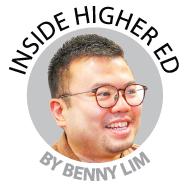GETTING into a university during my youth in the late 90s was definitely easier compared to my parents’ time, but it was still an important milestone and an assurance of a better future.
I remember the day I got the offer from the university and programme of my choice. I was ecstatic. I had not performed well for my GCE “A” levels and I took a huge risk by banking on just one programme. If I had failed to get the offer, I would have to apply again the following year or opt for a non-degree programme elsewhere.
Today, with the growing competition within the saturated higher education landscape, getting a place in a university is unquestionably more straightforward. Competition is especially stiff in Malaysia’s private higher education sector, where potential students often shop around for their preferred programmes and universities.
There are also more academic pathways these days. Students who do not meet the criteria to enrol in a Bachelor’s programme could start at a diploma level in the same university, with a clear path to eventually get into a degree programme with exemptions.
When compared to my time, students today are less likely to jump for joy when they receive a university’s offer letter.
Despite the differences between the past and present, one thing remains constant – the hope for a better future.
The idea of a better future is sometimes perceived as gaining employment after graduation.
Some universities even boast about the high employment rate of their graduates.
To me, this is a misconception.
The greater purpose of universities should be about improving the graduates’ employability, which refers to the ability to thrive at work. This “ability” is developed through the combination of knowledge, skills, attitude and values over the course of a university education.
Through the curriculum, students are equipped with the knowledge and skills necessary for the specialisation of study.
Most universities also require students to take up courses outside of their specialisation in a form of minors or electives, with the hope that students would develop interdisciplinary thinking.
Throughout my career, I have seen many students attending university for the sole purpose of acquiring knowledge and skills.
They come to classes and submit their assignments diligently.
Yet, these students do not immerse themselves into other activities within the context of campus life, despite being enrolled in campus-based universities.
To me, this is a missed opportunity.
With the growing number of distance learning and online academic programmes, students can now gain knowledge in a field of their choice at a fraction of the fees as compared to attending campus-based universities.
Nevertheless, at this point in time, distance and online education has yet to be able to offer a well-rounded education, which includes developing students’ emotions (empathy), values, ethics and networks.
In a way, online education is more suitable for postgraduate studies and lifelong learning, especially for students who already have prior employment experience.
Campus-based universities has the upper hand in providing opportunities for students to develop a range of soft skills through a variety of teaching methodologies and assessments, which include a mix of independent and group assignments.
Furthermore, universities often put in place experiential learning opportunities such as internships, field trips, and service-learning activities. Some campus-based universities also implement a collegiate system, where students from different faculties are placed in a college and are encouraged to collaborate on projects together.
Students pursuing higher education on campus-based universities should make full use of these learning opportunities to cultivate the attitudes and values that are important for employability.
The Covid-19 pandemic has greatly impacted how campus-based universities provide and carry out whole person developmental activities. Some universities have to significantly reduce their learning activities due to the SOP implemented.
In this digital age, our needs and demands propel the creation of new and enhanced technologies. The time will come when there will be an entire philosophy on how whole person education could be achieved through digital means.
For instance, general education courses could be taught online. Students could also undertake online-led, real-life mission-based projects, as well as online internship/exchanges. It is also highly possible for online education providers to employ technologies to enhance the networking amongst their transnational body of students.
Both campus-based or virtual universities should constantly improve their capabilities in knowledge transfer, as well as identifying innovative practices surrounding the development of students’ attitudes and values.
Dr Benny Lim is currently a professor and the director of the Master programme in communication and media studies, Università Telematica Pegaso (Italy), as well as a visiting scholar of cultural studies with the Chinese University of Hong Kong. The views expressed in this article are his own and do not represent the universities he is associated with.














